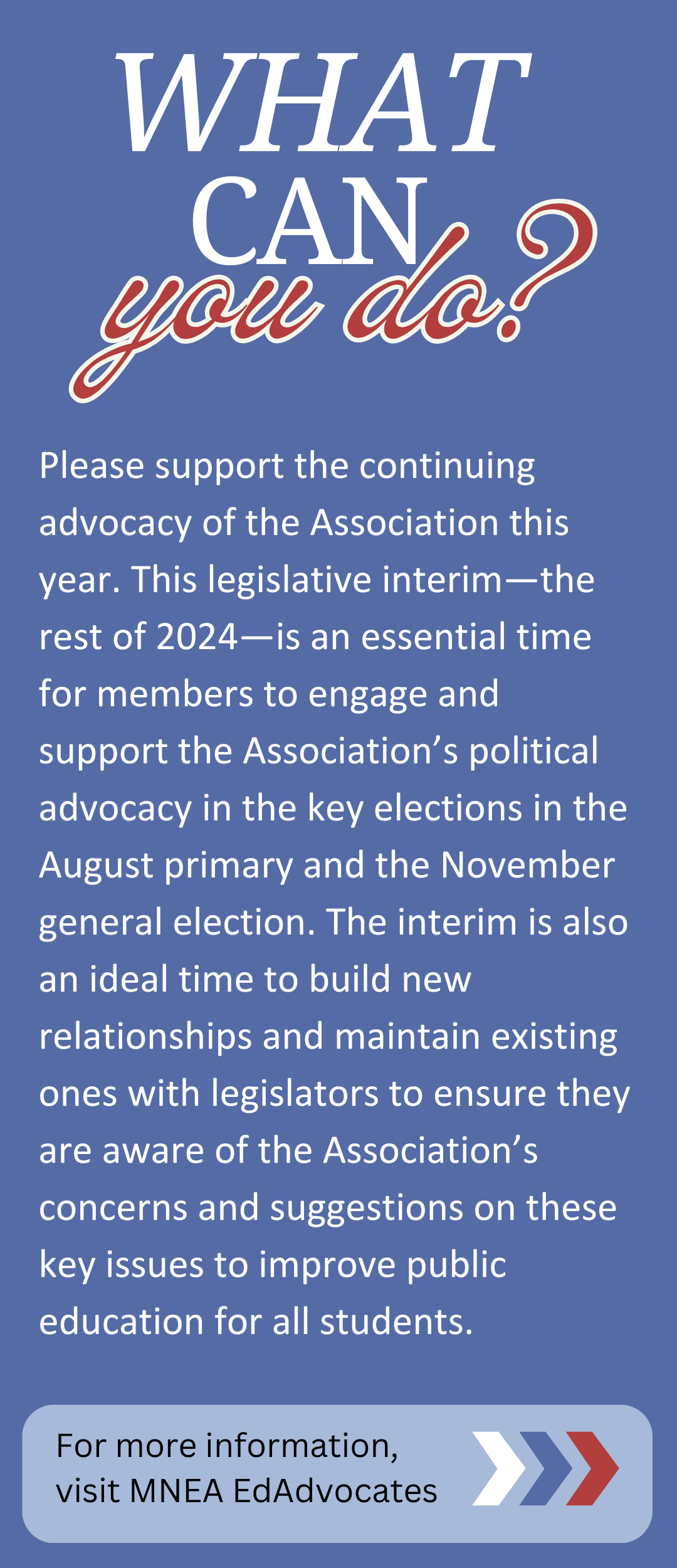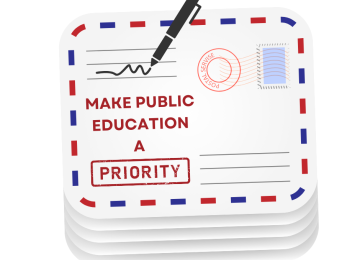MNEA held Capitol Action Days from February to early May. Members from around the state sent postcards to legislators to share positive messages on key policy topics. While it can be challenging to influence the intricacies of the legislative process, Association members played a crucial role by ensuring legislators understand how their actions affect our students and schools, and by educating them on the remarkable things happening in our public schools.
Voucher/Charter Expansion Bill
Governor Parson signed SS#2/SCS/SB 727 (sponsored by Andrew Koenig) into law on May 7. The Association opposed the bill. SB 727 expands the existing tax credit voucher program enacted in 2021 and authorizes the establishment of charter schools in any district in Boone County without sponsorship by the local school board.
The Association believes the bill moves the state in the wrong direction by expanding unaccountable charter schools into more communities without consulting local school boards, while also expanding vouchers that divert resources away from students in neighborhood public schools in favor of a few students attending private institutions with little oversight or accountability.
 School Funding
School Funding
The Senate added many provisions to SB 727 during floor debate. The bill includes increases in the state formula calculation for public schools. Additions include:
- Balancing Enrollment and Attendance: Funding will be based on an equal weight of student enrollment and student attendance.
- Small Schools Grants: The amounts for Small Schools Grants have been doubled.
- Pre-K Funding: The fraction of low-income pre-K students eligible to be counted for state aid has been doubled.
- Local Effort Calculations: Certain local effort calculations in the school formula have been revised.
SB 727 also provides extra funding for districts with a five-day week while requiring district approval of four-day school weeks in charter counties and cities with populations over 30,000. The updated fiscal note for the perfected bill indicates a cost to General Revenue of $468 million when fully implemented.
Teacher Recruitment and Retention
SB 727 increases the minimum teacher salary from $25,000 to $40,000, and sets the minimum salary for teachers with ten years’ experience and a master’s degree at $46,000. The bill also includes other changes regarding teacher certification, salary schedule placement, Career Ladder, and other teacher recruitment and retention provisions.
Additionally, SB 727 makes changes regarding PSRS (Public School Retirement System) working after retirement. It allows districts to set salaries for positions filled by retirees, permits members on disability retirement to work and earn up to 50% of the pay for the position, and reduces the penalty for exceeding 550 hours to the actual amount of excess earnings rather than a full month's pension.
Budget
Late House action and Senate dysfunction meant the legislature did not have time for the typical budget conference. Instead, the House agreed to the Senate Substitute versions of the budget bills on May 10, completing passage of next year's state budget just hours before the 6 p.m. deadline. The Governor has line-item veto authority regarding the distinct items in each of the budget bills.
The final version of the budget includes the $120.6 million increase in formula funding from lottery funds as contained in the House version. Changes in MSIP 6 require this formula increase to adjust the State Adequacy Target (SAT). The formula increase needed to fully fund in the 2025-2026 school year will be $300 million.
The budget also fully funds pupil transportation for the next school year and continues state funding for teacher pay baseline grants for districts with starting salaries below $40,000. SB 727 will require these higher salaries beginning in the 2025-2026 school year. The higher education budget includes a 3% core funding increase for Missouri public institutions.
The final budget made significant cuts in Medicaid funding programs, which may run out of funds as soon as this December. Accordingly, a special session seems likely this fall to pass a supplemental budget bill to sustain those programs. SB 727 will also increase K-12 expenditures next fiscal year. These increases are not provided for in the final budget, and a supplemental appropriation will be needed at some point in the coming fiscal year for these items as well.
Veto Session Concludes
The House and Senate convened in Veto Session on September 11, as required by the Missouri Constitution. Governor Parson vetoed no regular bills enacted during the regular session but did make 173 line-item vetoes in the House budget bills, reducing appropriations by about $1 billion.
The House approved no motions to override any of the line-item budget vetoes, and both chambers adjourned, concluding the Veto Session.
In his veto statement, Governor Parson noted that the vetoed appropriations would reduce the state's remaining fund balance. He emphasized the need to maintain adequate fund balances to meet the increases in education funding required by the passage of SB 727 earlier this year.
The Association urges the legislature to focus on fully funding and implementing the formula provisions of SB 727 when the session resumes in January.
Restoring Local Control of Schools
While no legislation on this topic passed, the session gave attention to positive bills seeking to reduce the negative effects of the misuse and overuse of standardized testing. HB 1851 (sponsored by Paula Brown) and SB 814 (sponsored by Jill Carter) both contained provisions to address this issue, and both bills were voted out of committee with strong support. The Association supported both bills throughout the session. This issue will factor into education discussions in the next session.
Initiative Petition Changes
The legislature again focused on proposals to make it harder for Missouri citizens to amend the Constitution through the initiative petition process. Senate Democrats staunchly opposed the measure all session, particularly versions with the so-called "ballot candy"—deceptive provisions meant to distract voters from the main proposal to weaken the process. Meanwhile, "Freedom Caucus" members delayed Senate progress this session on key issues such as FRA and the budget to leverage a vote on an initiative petition measure.
The issue dominated legislative action during the last week of the session. The version in SS#4/SJR 74 (sponsored by Mary Elizabeth Coleman) was the only issue debated by the Senate during the entire last week. The Senate failed to pass a version with ballot candy, and the House rejected the Senate's request for a conference. The measure died on the final day of the session.
The Association opposed the joint resolution, believing it would have made it more difficult for Missouri citizens to bring forward and gain approval on measures of interest through the initiative petition process.

